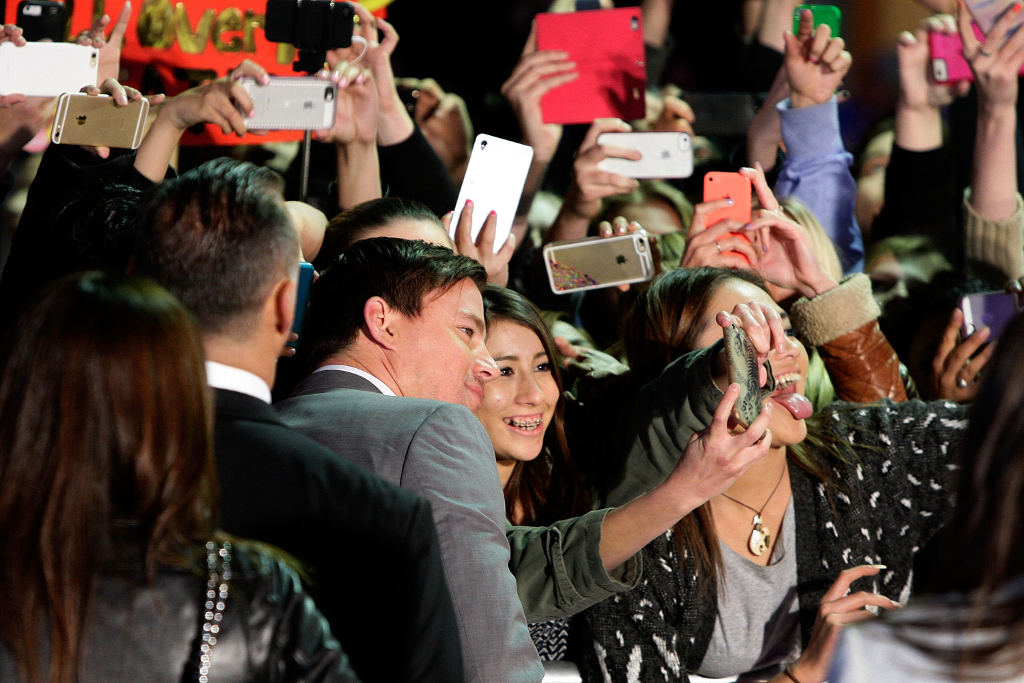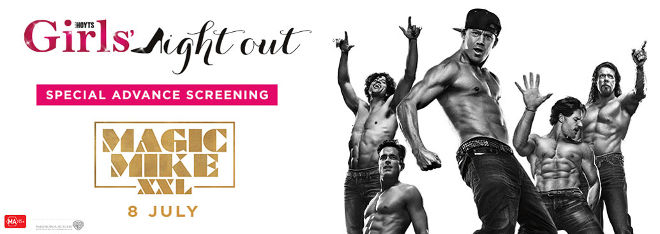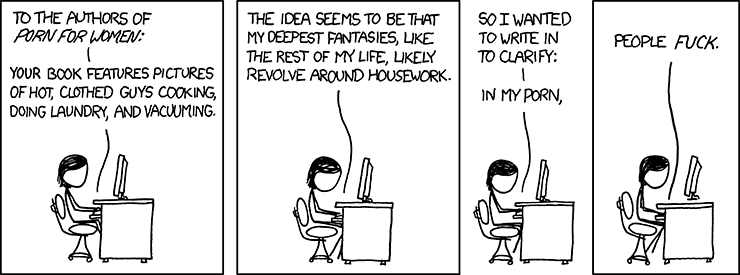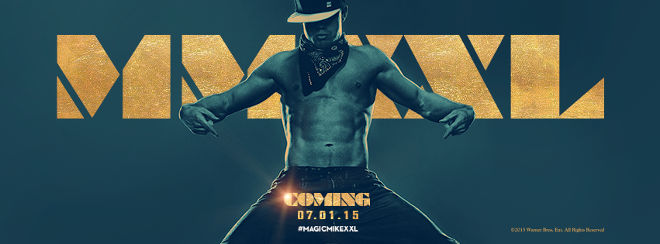On ‘Magic Mike XXL’, And The Increasing Market Value Of Lady-Thirst
I look forward to when movies full of half-naked women are this brashly funny, honest, and full of genuine insight about why we love sex almost as much as we love the promise of it.

Australian premieres are usually relatively low-key affairs. Even if The Talent bother to fly across the world to grace us with their presence, they’ll usually be walking a red carpet outside the cinemas on Sydney’s George Street, where most of the city’s population has puked after too many $3 vodkas at Bar Century. The Qantas Credit Union Arena (formerly the Sydney Entertainment Centre) is no more glamourous, really, but the phrase “arena premiere” has a certain sparkle to it that suited Monday night’s premiere of Magic Mike XXL, the unlikely blockbuster sequel to 2012’s small-budget Steven Soderbergh indie film about male strippers in Florida.
At the very least, the fact that the biggest-ever film premiere in this country (by volume, one assumes, both in terms of capacity and screams) was for a movie so devoted to the pleasure of straight women says something about the increasing commercial value of lady-thirst.
As the assembled fans and media lining the red carpet waited for the stars of Magic Mike XXL to arrive, a DJ was spinning selections from the film’s soundtrack — and, apparently, from Thirstiest RnB Hits 1995-2015. Recent Rihanna, non-‘Mr Bombastic’ Shaggy and earlyish Beyonce flowed into and out of the established Magic Mike theme song, ‘Pony’.
A lower-key selection was D’Angelo’s ‘Untitled (How Does It Feel)’, which stirred even less response than ‘Pony’ (kids these days have no respect for the classics). As I found out later in the evening, the song appears in the film and on the soundtrack, but at the time it seemed an odd choice: the sex-symbol status the video pinned to D’Angelo nearly destroyed his career, as he struggled to get through shows full of women screaming at him to TAKE IT OFF. I felt a sudden trickle of discomfort about why we are all there; objectifying men is, thanks to the magic of historical, cultural and social context, not nearly as fraught or politically incorrect as objectifying women. But there’s still a line where it stops being a fun and sexy time and starts being dehumanising — and watching the local Magic Mike XXL Dancers wander the red carpet in a slightly bemused fashion, flashing their abs at the fans on the barricade in exchange for piercing screams like a Mardi Gras of lady-thirst, I wondered where that line sits.
Equal Opportunity Objectification
After arriving a few minutes early, Channing Tatum and Joe Mangianello were shepherded up and down the red-carpet hierarchy, patiently and warmly answering journalists’ questions with pre-loaded lines about “equal opportunity objectification”, and crouching down to pose with fans, with practiced eye-twinkles set to ‘stun’. Tatum acknowledged one of the ‘Pony’ snippets with a good-natured bit of thrusting — a tiny, invisible lasso in his hand — to the screeching delight of nearby fans; he makes it look as though he just can’t help himself, and maybe he can’t. (He does seem to be excessively good-natured.)
Determined to grill the talent on something other than their abs, I asked Mangianello whether he’d rather fight a Channing Tatum-sized duck or 50 duck-sized Tatums (he reckons he could take the latter, for the record). I also asked what he’d say to a young man who hasn’t had this movie marketed to him at all, and doesn’t think it’s for him. “I would try to hold back judgement about the movie before you actually see it,” Mangianello replied, “because any guy who doesn’t see it is missing out on a lot of laughs. It actually is a good date movie — it’s fun.” I asked the same of Gregory Jacobs, who took over from (the allegedly retired) Soderbergh as director of XXL: “I think they’re a good group of guys to hang out with, and I feel like the positivity of the movie is for everybody.”
This is all true, actually. I can’t remember the last scene in a film that made me laugh as much as Mangianello’s snack-dance seduction of a gas station attendant, or the last time I saw a scene full of hetero dudebros openly discussing their emotional lives without the security blanket of “no homo!” jokes. I felt genuine affection for this ragtag bunch of strangely innocent, devastatingly handsome manchildren after just a few minutes back in their presence. But these elements are no more central to proceedings than the winking, parent-friendly jokes in Pixar movies. The posters promise nothing but bodies: bigger, better, bulgier, against a white background so as not to distract from all the rippling. Extra extra large. Come again.
Then there are those “Girls Night Out” chain-cinema events, where they pink up the posters and splash some Yellowglen into a plastic flute, clearly anticipating gaggles of twenty-somethings in bandage dresses and housewives mildly scandalised by their own naughtiness. Getting boozed and hanging out with ladies is an excellent way to spend an evening, but the patronising tone of ‘Look, ladies, this one’s especially for ladies! What a fun and sexy time for you!” (even more prevalent in the marketing for the Fifty Shades movie) feels as unnecessary as a Bic For Her, like we’re being shepherded into designated Girls Having Fun Together zones.
Women shouldn’t need a safe space to enjoy looking at manbutts, when most of our cultural world is a safe space for people who like to look at boobs; correct me if I’m wrong, but there was a distinct lack of “Boys Night Out” promotions around Furious 7, and yet men went to see it with their friends anyway.

But while the film’s marketing seems to exploit a simplistic assumption — that women are so starved for sexual expression and titillation in films that we’ll queue round the block for a movie devoted to it — the film itself responds to the systemic forces that are to blame, while exhibiting more respect for women’s desire and sexual agency.
In the film (and at the premiere itself), women are repeatedly reassured that the act of merely going to a place where they can see talented, shirtless men dance is to be applauded: you came here to be exalted because you are a queen, and you deserve it. Meanwhile, the lack of respect and attention paid to women’s desire is painted as a failure of a world constructed around men, not as a failure of women who didn’t go out and get what they want before now – the world has a history of punishing women who do that, after all.
When Donald Glover’s character tells Matt Bomer that the secret to pleasing women is to ask what they want, it’s not patronising – it’s a pointed comment on how often women’s desires and priorities are assumed to be along certain, narrow lines.

via XKCD
It’s About Respect
In Magic Mike XXL, Jada Pinkett-Smith plays the steely emcee and owner of an exclusive club: a safe space for women who want to get close to extremely beautiful, masculine men, and revel in both the dancer’s attention to them, and in their own sexual power. Nothing feels more powerful than being fully in your own body, and being aware of what it can do and feel, and do for others. If you get that from yoga, awesome. If you could also get it from Channing Tatum flipping you upside down and motorboating your taint through your going-out jeans in front of your girlfriends and three dozen strangers while you squeal delightedly and hold on for the ride, then that’s the definition of empowering, and don’t let anyone tell you otherwise.
Of course, there is more to the movie itself than simulated face-fucking and lovingly contoured pecs (there is SO much simulated face-fucking, though). Not much more, but enough — even without Matthew McConaughey’s mesmerising Dallas and Alex Pettyfer’s sweetly blank Kid, the crew (whose new name I won’t spoil) have a rapport worthy of its own hangout sitcom. While some of the finer detail is lost (particularly with the muddy arena sound at Monday’s premiere), the scenes where the guys debate their plans or get to know new people on the road have that startlingly natural rhythm Altman movies do so well. Because so little is at stake beyond the “one last ride” conceit, what plot there is hangs on the guys rediscovering why they worked well together, reaffirming their friendships, and putting more of themselves into their work in order to do that work better.
This professional and personal pride speaks to the movie’s respect for their work, and for the craft of entertainment. Similarly, the guys’ molly-and-wine-fuelled efforts to move beyond the cliché Village People occupational-eroticism stripper schtick is a sign of their growing self-respect, as well as a heightened respect for the women they dance for. The idea that women are specifically turned on by a uniform (representing the deeply unsexy conflation of institutional power and male strength) feels as dated as a Fanta-tanned Chippendales beefcake; the personal themes each dancer chooses for the finale reflect that men, like women in Dove commercials, are each beautiful in their individual ways. Every man has a version of sexy that works for him, whether it’s puffy-shirt romance, crooning ‘How Does It Feel’, or mixing sweetness in the streets with Trent Reznor in the sheets.
So how does it feel? A lot of the dancing is sexually aggressive in a way that might not be to everyone’s taste, although the women — of all different body types and a variety of ages, which was a nice surprise — who are flung into the routines seem to be both shocked and delighted at how much they enjoy it. (There’d be a distinctly different feeling to it if it wasn’t clear that every member of the audience, with one exception, was genuinely gagging to be pulled up on stage.) The vaguely predatory feeling that had pricked my bleeding-heart feminist conscience while I waited with the fangirl hordes outside – They’re not pieces of meat! Maybe Joe Mangianello wants to be asked about his charitable works for once! Is it weird that we’re all here to see them naked and they know? – was more than dispelled. I felt welcomed, worshipped, elated, and suddenly extremely fond of all my fellow thirsty ladies. Magic Mike XXL is pure fun, and it doesn’t have a nasty or judgmental bone in its glistening body (unless you mean “nasty” the way Ginuwine sings it).
As for the five thousand or so audience members in the Qantas Credit Union Arena, the majority weren’t there for Soderbergh’s pseudonymous camera work (or the hilarious Ocean’s shout-out at the very end), or the sex-positive feminist overtones. They were there to scream when Mangianello’s exceptionally naked posterior makes an appearance, to scream when Tatum flips his cap around like a magic trick; to wait for franchise trademarks (‘Pony’, body rolls) and then scream at them with the fervour of Marvel dorks at a midnight screening awaiting Samuel L Jackson and his eyepatch.
They were there to feel catered to, and there’s no way they left unsatisfied. If this is the face of equal-opportunity objectification, I look forward to when movies full of half-naked women are this brashly funny, honest, and full of genuine insight about why we love sex almost as much as we love the promise of it.
–
Magic Mike XXL is in cinemas now.
–
Caitlin Welsh has written for The Guardian, The BRAG, Mess + Noise, FasterLouder, Cosmopolitan, The Vine, and more. She tweets from @caitlin_welsh
Feature image taken at the Australian premiere of Magic Mike XXL, by Lisa Maree Williams for Getty
